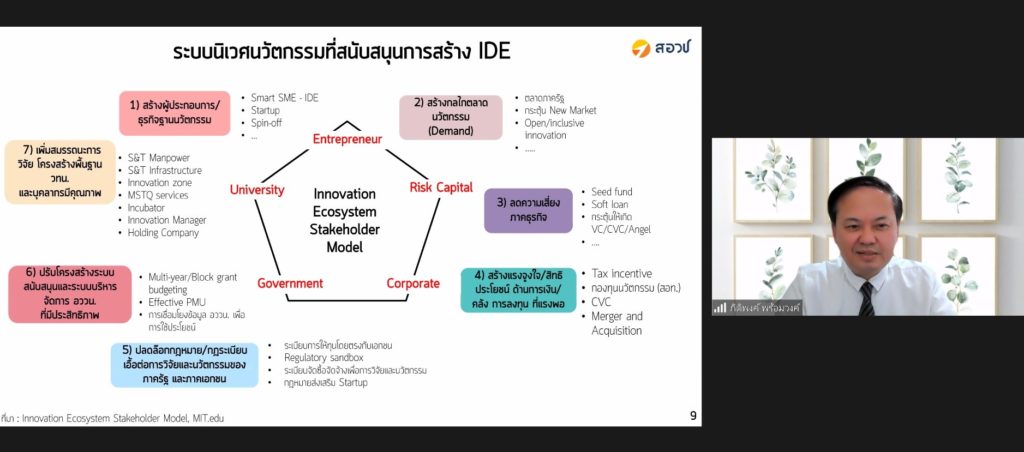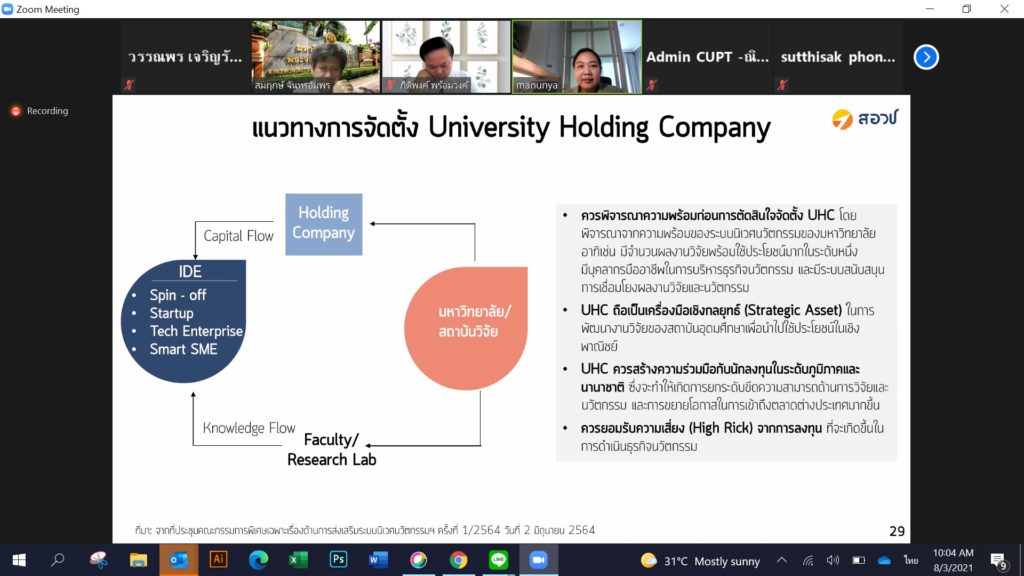
NXPO President Dr. Kitipong Promwong recently gave a presentation to the Council of University Presidents of Thailand, discussing holding company initiative and university’s mechanisms for investment in innovation businesses. The meeting was attended by vice presidents in charge of research and innovation of 35 universities. His presentation is summarized below.
Thailand’s GDP growth has been on the decline from 1980 to 2020, with little to no growth in high-tech industry. Top 10 companies listed on the Stock Exchange of Thailand are old economy companies. It is imperative that Thailand focus on the development of innovation-based economy, including the creation of innovation-driven enterprises (IDEs), in order to break free from the middle-income trap. The target has been set to have 1,000 IDEs achieving 1 billion THB revenue and 5 companies listed on the Fortune Global 500. According to Crunchbase information, total investment raised by Thai startups in the first quarter of 2021 was 1.058 billion THB, around 0.2% of GDP. The government also set the target for gross expenditures on R&D (GERD) to 2% of GDP. To achieve all these targets, the government is focusing on building a healthy innovation ecosystem starting in universities

An innovation ecosystem, according to Massachusetts Institute of Technology (MIT), is made up of five stakeholders: 1) entrepreneur, 2) risk capital, 3) corporate 4) government and 5) university, each has distinct roles to play and contribute to the success of innovation ecosystem. In Thailand, progress has been made in the development of innovation ecosystem by Ministry of Higher Education, Science, Research and Innovation (MHESI), particularly in the areas of IDEs, mechanisms to bring innovations to market, business risk reduction, investment incentives, system reform, ease of doing business and holding company initiative.
University holding company is a mechanism that allows universities to professionally manage their business investment. It operates as a private entity which enables flexibility, agility and business-driven decision making, as well as facilitate spinoff companies. Examples of successful holding companies include Tsinghua Holdings and Tus-Holdings in China, LiU Holding in Sweden and Industrial Technology Investment Corporation (ITIC) in Taiwan. Some examples in Thailand are CU Enterprise of Chulalongkorn University, Ang Kaew Holding of Chiang Mai University, M Venturer of Mahidol University, Nawawiwat of King Mongkut’s University of Technology Thonburi and TUIP of Thammasat University. Most Thai university holding companies are in early stage – around 1-2 years old, has small registered capital ranging from 0.25-200 million THB and are almost entirely owned by universities with their management team drawn from faculty members. Most companies have innovations ready for commercialization.
NXPO’s study reveals barriers that limit joint investment between university/research institute and industry through the holding company mechanism as being: 1) Understanding in the status and operational framework of holding companies is limited; 2) Holding companies are not run by a professional team who have experience and skill in innovation businesses; and 3) Some universities have limited fund or are limited by financial regulation to utilize fund for business investment.

The National Higher Education, Science, Research and Innovation Policy Council (Policy Council) has issued policies and measures to facilitate the establishment and implementation of holding company mechanism such as a development of university holding company guidelines, revision university regulation to facilitate business investment and promotion of spinoffs and startups in universities.
University holding company guidelines, developed by NXPO, cover issues such as legal framework, company establishment procedure, governance, and knowledge/technology exploitation and recruitment of professional staff.
Dr. Kitipong added that though Thailand’s GERD had been on the rise, the number of IP applications had yet to follow the trend. Universities are encouraged to intensify their R&D and take advantage of the new scheme that gives flexibility to faculty members to work for companies as a way to promote commercial research.








